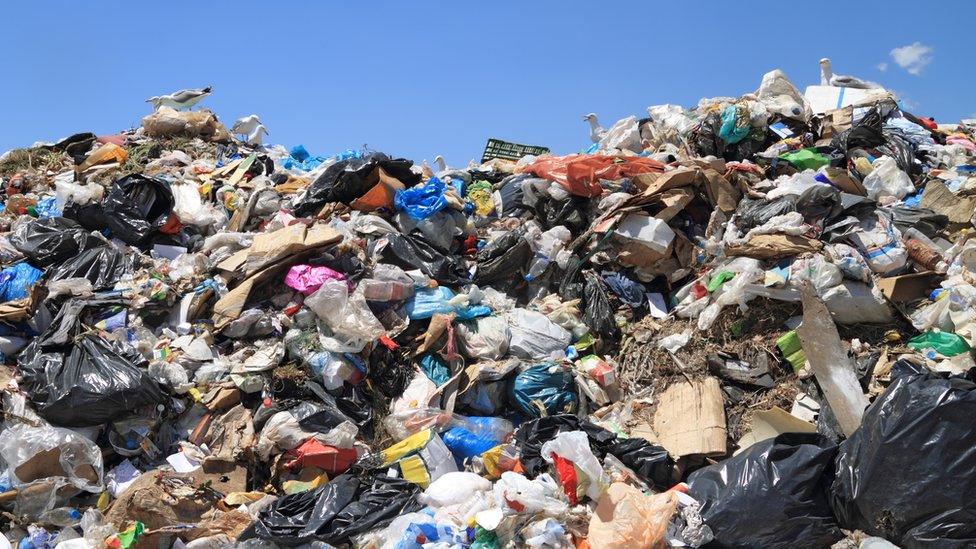Plastic recycling: How do bottle deposit schemes work?
- Published

A scheme is being proposed to encourage recycling and cut plastic waste, which would see customers in England pay more for drinks in the shops.
Customers will then be able to claim the money back if they return their drinks containers to be recycled.
The scheme will apply to all single-use drink containers whether they are plastic, glass or metal.
Scotland has already announced plans for a deposit return scheme, while the Welsh Assembly is also looking into the possibility.
How might it work?
How exactly this will work is going to be consulted on, but we can look to other countries with deposit return schemes for clues.
There are 40 countries and 21 US states with some kind of deposit return scheme currently in operation.
A small extra cost (between 8p and 22p) is added to the price of the drink, which is then refunded to the customer when they take it back to be recycled.
In some areas, bottles or cans are taken back to the shop they were bought from, while in others a network of automated collection points known as "reverse vending machines" have been installed.
If a customer doesn't return a bottle to collect the deposit, that money can be given to the producers, retailers, donated to charity or funnelled back into running the scheme.
Will it increase recycling?
Research by the parliamentary Environmental Audit Committee, external found countries with deposit return schemes tended to recycle between 80% and 95% of their plastic bottles.
In Norway, 95% of all plastic bottles are now recycled, compared with England at the moment where the rate is 57%. About half of all the plastic bottles used in a year in England are water bottles.
But research commissioned by Defra, external also identified some areas such as South Australia and California that have deposit schemes and similar rates of recycling as the UK.
Comparisons are difficult though - overall rates of recycling also depend on how effective systems such as the kerbside collection of household waste are.
Wales, for example, has a much higher recycling rate than England. It operates a single recycling system across the country rather than separate systems in every local authority area.
Almost all local authorities in England have kerbside collections of plastic.
But the Environmental Audit Committee heard England had a "particularly high" level of consumption of drinks in single-use plastic bottles outside the home.
So this suggests a deposit scheme could be a good way of increasing recycling in England.
At the moment, more than 95% of the plastic bottles that are processed for recycling have been collected from households.
What about littering?
There's not much evidence to suggest deposit schemes reduce littering.
The Defra-commissioned research said that although "the general assumption appears to be that receiving a monetary or other reward will encourage consumers to deposit containers at a collection point instead of littering", there was little data to support this.
A German study, external published four years after its deposit scheme was introduced found no evidence of litter reduction.
Who pays?
This varies and depends on the design of the scheme.
In Germany, retailers and the beverage industry have to bear the costs and in return are allowed to keep any unclaimed deposits.
But in other countries the cost is passed on to the consumer.
Several countries with deposit return schemes have a centralised non-profit operating system that runs the collection points and takes back any money from unclaimed deposits.
How much could it cost?
Again, lot of this comes down to how the scheme is designed, so it's too early to put a precise figure on it.
For example, the costs attached to installing a network of "reverse vending machines" will be different to those attached to training existing staff in shops to handle the deposits.
Environmental consultants Eunomia estimated one machine could cost £30,000 to buy, £2,000 to install and another £2,700 a year to operate.
The German system is estimated to have cost , externalabout £600m (726m euros) as an initial set-up in 2003, and about £700m (793m euros) annually for maintenance.
A Department for Food, Environment and Rural Affairs (Defra) spokesman told Reality Check: "It's important to recognise that not all deposit return schemes are the same. The specific model, scope and scale of any scheme can have a significant impact on costs and will be part of the consultation."
Has the UK ever had a deposit return scheme for bottles?
From the 1960s, a money-back deposit scheme was introduced in the UK for glass bottles - but this died out with the advent of cheap plastic bottles in the 1980s.

